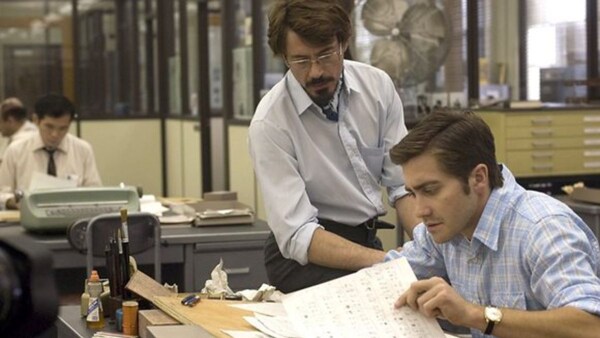Thriller Thursdays: Zodiac - A David Fincher masterpiece!
A serial killer terrorizes the San Francisco Bay area, teases the police and journalists with cryptic messages, and makes an unlikely detective of a cartoonist.

Last Updated: 10.39 PM, May 05, 2022
Intro: In our weekly column, Thriller Thursdays, we recommend specially-curated thrillers that’ll send a familiar chill down your spine.
There are police procedurals and there are ‘police procedurals’, and then there is Zodiac. After all these years, the film still stands tall as one of the finest thrillers made, and one of director David Fincher’s masterpieces.
What gives incredible heft to the film is that it is based on the life of an actual serial killer who was hunted by law enforcement agencies across several counties in the San Francisco Bay area in America.
The story begins in 1969, with the attack on a couple in a car in Vallejo, California, who are shot at point-blank range, killing the girl. The intrigue commences when the murderer sends encrypted letters to various newspapers, calling himself Zodiac, confessing to the murder, and asking them to publish his coded letters on the front page of their newspapers or face repercussions in the form of more murders. And thus begins a relentless series of random killings, each followed by teasing letters, to newspapers, detectives, et al.

Following the case is San Francisco Chronicle’s maverick, albeit alcoholic, crime reporter Paul Avery (Robert Downey Jr) and a cartoonist Robert Graysmith (Jake Gyllenhaal). Graysmith simply loves solving puzzles, and he is able to crack the messages and also anticipate some of the killer’s moves.
Police inspectors Dave Toschi, an increasingly harried Mark Ruffalo, and Bill Armstrong, a stolid Anthony Edwards, are assigned to the case. As in the case of most police procedurals, they are forced to find a way to work together with other law enforcement agencies, through the labyrinthine bureaucracy. Hence, the concurrent work done by the press both supplements and irks them. But as clues come by, false leads emerge like weeds, and volunteers come in with fantastical theories and confessions. And the police have their work cut out, to sift through the messy and myriad distractions to cut to the heart of the deadly matter. And that’s when the investigative journalists provide the detectives with concrete leads which they failed to comprehend.

But the sporadic nature of the murders confounds the police and brings both puzzlement and lethargy to the case, which is then thrown into cold storage. But not for Graysmith, for whom the case becomes a personal obsession, to the extent he is ready to accept a breakup with his girlfriend and lose his job so that he can identify the Zodiac killer and look him in the eye one day.
Typical in police procedurals is the nature of details - and at times tedious detailing, within which lies the true way into the heart and head of a criminal. But David Fincher brings a rare atmospheric feeling to the proceedings. In his factual manner of storytelling lies a razor-sharp incisiveness with incredible use of light, music, and dialogue. He fashions the murders with slow deliberation, and diffused theatrics, which counterintuitively punches an immense impact.

There are tremendous scenes of extreme tension, such as when the Zodiac killer courts a woman without realising that she has an infant with her and when she asks if it was a problem, to which he replies, “When I’m done with you, it wouldn’t matter anyway.” Or when Graysmith goes to the house of someone he assumes had worked with Zodiac, but along the way realises that the man might be Zodiac himself! The effect on the viewer is of a blade slowly being inserted, without the realisation that it is being thrust deep inside - until it reaches the heart!
Zodiac, both as a person and as a concept, is crafted into full realisation by his descriptions, his voice, his background, and people’s recollections. The film spends time and depth discussing what makes a serial killer do what he does. Zodiac himself justifies it to headaches which get cured when he kills. The police, cynical and overwrought with what they see on a quotidian basis, say that killing is either in his blood or he simply likes it. And hovering between the two extremes is a man’s brain, within which evil is often rationalised retribution for what a perpetrator might have faced at some point in his life from someone.

One of the greatest pleasures of the film is how it is choc-o-bloc with outstanding performances, be it Robert Downey Jr as the passionate unhinged journalist or Mark Ruffalo as the increasingly frustrated inspector who is then himself accused of misfeasance, or Jake Gyllenhaal as the obsessed cartoonist who makes Zodiac’s unveiling a personal life mission, and on whose books the film is actually based on.
But deep in the substratum of the film lies the nature of obsession, how it engenders the ruthless completion of endeavours, even as it concurrently destroys lives. And the film talks about how solutions lie in plain facts within the sunlit ordinariness of things - if only we have the eyes to see them. In our search for the treasures of our efforts, we are all really reflections of the protagonist of The Alchemist - circling the world to understand its inequities and blessings before the mountains appear or our souls break.
Trivia
- Screenplay writer James Vanderbilt was only 15 years old when he first read Robert Graysmith's book and had made up his mind to adapt it into a movie. So when the rights to the book came up for purchase, he faxed Graysmith talking about his vision of how he saw the film being made.
- Clint Eastwood's Dirty Harry was based on the story of Zodiac, with Harry Callahan, played by Eastwood, pursuing the murderer. David Fincher hated the film, saying the denouement was too pat.
- Director David Fincher was completely ruthless and obsessive in the exactitude of his shots, and on occasion got Gyllenhaal to shoot more than 70 takes for a single shot, completely flustering the actor - and making him complain publicly about it!
- Fincher refused to use any artificial blood effects and got them digitally added because otherwise, he would delay the film, particularly because he shot so many takes, and was perennially running against the clock.
Watch Zodiac here.
(Views expressed in this piece are those of the author, and do not necessarily represent those of OTTplay)
(Written by Sunil Bhandari, a published poet and host of the podcast ‘Uncut Poetry’)

 Premium
Premium